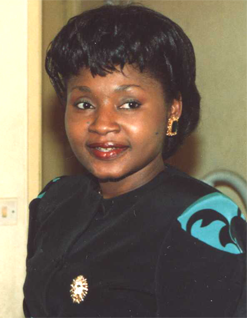|
 Mbilia Bel (Mbilia Mboyo, Marie-Claire), Congolese singer; born Kinshasa, Aug. 14, 1959. Mbilia Bel (Mbilia Mboyo, Marie-Claire), Congolese singer; born Kinshasa, Aug. 14, 1959.
Mbilia dropped out of school in 1977, at the age of seventeen, to accept a position in the troupe of singers and dancers that accompanied the grand dame of Congolese music, Abeti. Well-seasoned after four years with Abeti, she joined Sam Mangwana for a series of concerts around Congo-Kinshasa (then known as Zaire). Near the end of 1981, as the Mangwana tour came to a close, Mbilia auditioned for Tabu Ley, leader of the Congolese rumba band, Afrisa. Ley hired her on the spot, giving her the stage name Mbilia Bel.
Mbilia's sexy good looks and limpid soprano revitalized Afrisa and sent its records streaking, once again, toward the top of the charts. "Mpeve ya Longo" (holy spirit) from 1982 tells of the domestic problems women face. Although Ley wrote the song, having it sung by a woman from the woman's point of view was a rare episode in the male-dominated world of Congolese music. A year later Mbilia addressed the myth of male supremacy with "Eswi yo Wapi" (where did it hurt you?), a song she and Ley wrote together about a man getting a taste of his own medicine. The performance won Mbilia "revelation of the year" honors from Kinshasa's music writers.
Off mike, the collaboration between Ley and Mbilia produced a daughter named Melody. By 1986, however, the smooth road of success grew rougher. A spectacular concert called Music-Media '86 was a hit with the public, but soon afterward rumors of an Mbilia Bel suicide attempt began to circulate. Talk increased when Ley started to bring other women into the band. Following another grand Kinshasa concert in 1987 where Mbilia stole the show, she left Afrisa and moved to Paris to launch a solo career.
Mbilia entered a Paris studio in 1988 in the company of Congolese guitarist-producer Rigo Star to record perhaps the finest work of her career. Phénomène, a six-song album from the Afrisa mold, won international acclaim and plaudits in Kinshasa where people still mourned her departure. Subsequent works failed to measure up to Phénomène. By the late nineties Mbilia Bel was heard, more often than not, on the recordings of other musicians. She surfaced as a solo again in 2002 with a new CD, Welcome, produced by guitarist Souzy Kasseya, but the effort failed to re-start her stalled career. As the decade wore on Mbilia was reported to be spending more time in Kinshasa, perhaps searching for inspiration.
At her peak, from 1982 until the end of the decade, Mbilia Bel was one of Africa's best-known and most popular female performers. Her bell-like voice, polished delivery, and considerable physical beauty made her a formidable presence on the stage and in the studio. Following in the footsteps of her early mentor Abeti, she demonstrated anew that a woman could be successful in the once forbidden world of show business.
© 2011 Gary Stewart
SELECT DISCOGRAPHY
Phénomène (Flash Diffusion FDB300016) 1988; Désolé!!! (Mélodie 66887-4) 1991; 8/10 Bénédicta (Sonodisc CD74343) 1996.
With Afrisa: Faux-Pas (Genidia GENCD1031) eighties recordings reissued 1996; Bel Ley (Kaluila KL0177) eighties recordings reissued 1998; Bel Canto: Best of the Genidia Years (Stern's STCD3037-38) 2007.
SELECT BIBLIOGRAPHY
M. Mbarga, "Mbilia Bel ou le secret du succès," Amina (Paris, Oct. 15, 1985); G. Stewart, Rumba on the River (London and New York, 2000).
|

